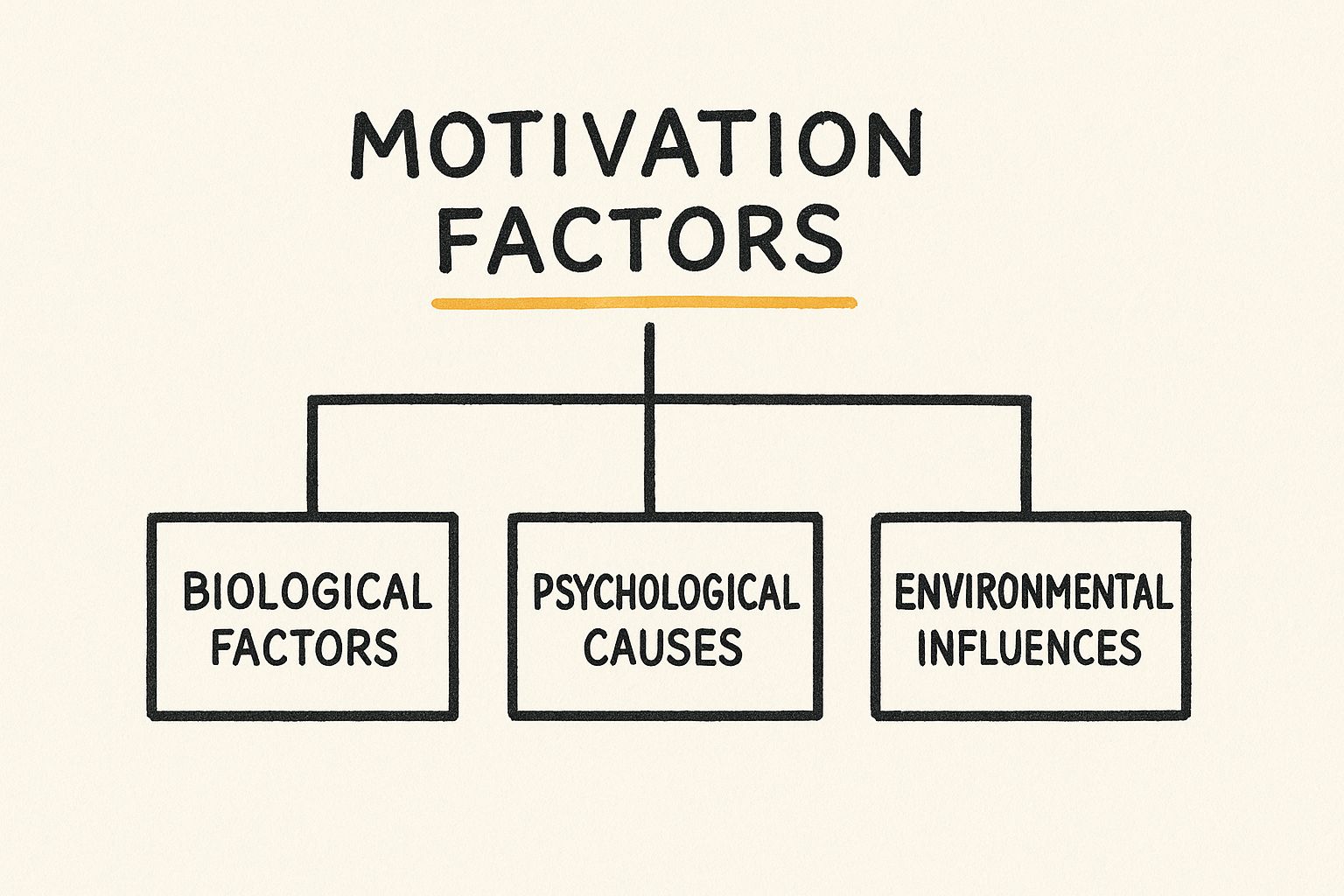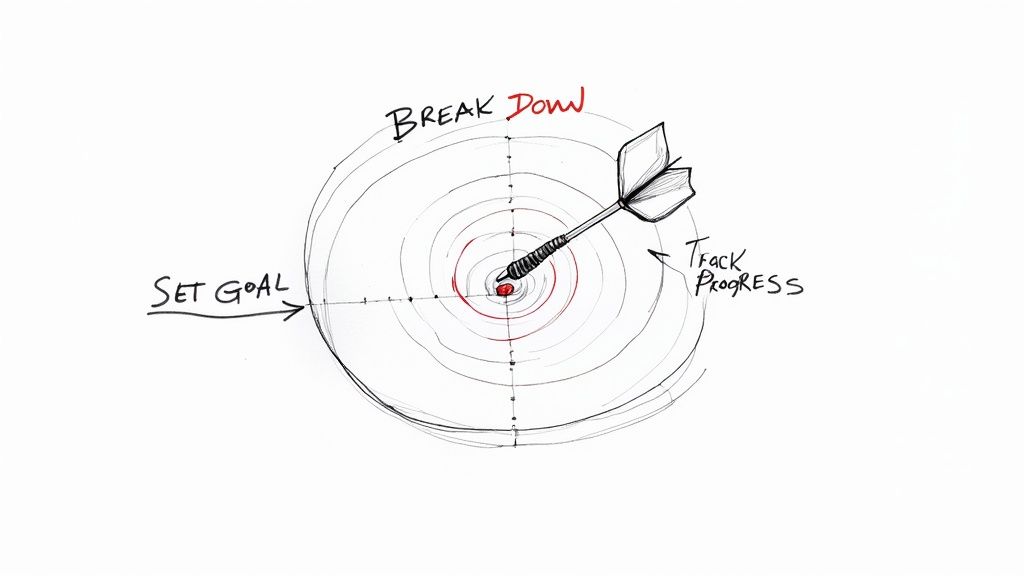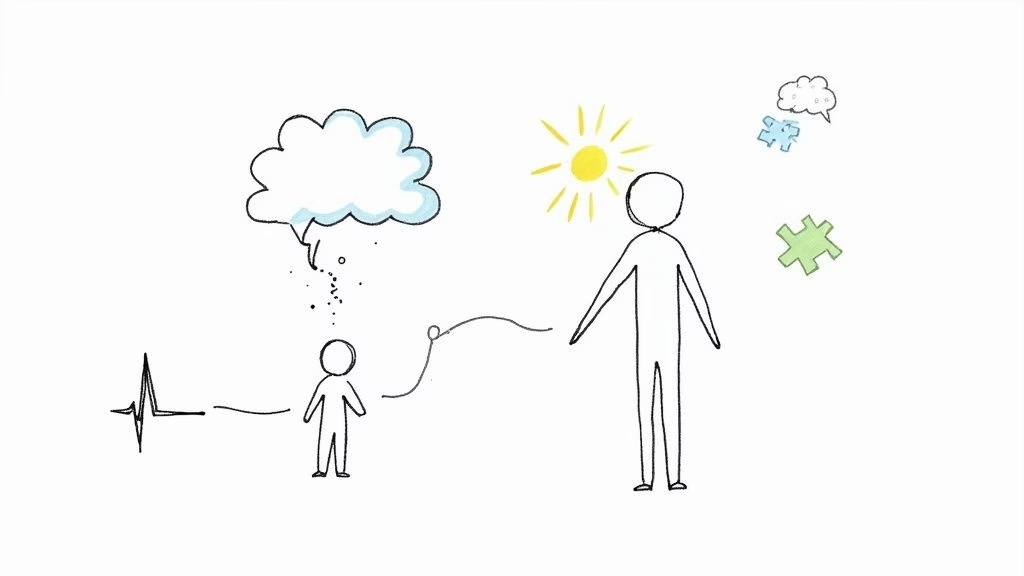If you’re asking yourself, “why do I have no motivation,” I want you to hear this first: you are not lazy or broken. That feeling is a critical signal from your mind and body that something is out of balance. Motivation isn’t some infinite well you can draw from; it’s more like the battery on your phone, getting drained by all the little things running in the background of your day.
Understanding Why Your Motivation Has Vanished
Think about that phone battery. You start the day with a full charge, but different apps—stress from school, a bad night’s sleep, an unresolved argument—can drain it way faster than you realize. When you feel completely unmotivated, it’s not a character flaw. It’s a “low battery” warning. Your system is telling you it’s time to figure out what’s draining your energy instead of just trying to force yourself to push through on empty.
The reasons for this energy drain are usually complex and tangled together. They can be psychological, like the immense pressure to get good grades or a crippling fear of failure. They might be biological, maybe stemming from poor sleep or a diet that’s not giving you what you need. In fact, a lack of motivation can often be traced back to underlying physical or mental health challenges, like common vitamin deficiencies, sleep issues, and anxiety. And, of course, your environment—a stressful home life or social pressure from friends—plays a massive role.
The image below shows how these forces—Biological, Psychological, and Environmental—all feed into your overall motivation levels.

As you can see, a lack of motivation is rarely a one-off issue. It’s almost always a mix of what’s happening inside your body, within your thoughts, and in the world around you.
Pinpointing the Source of Your Energy Drain
The first step to recharging is figuring out which “apps” are draining your battery the most. Honestly, understanding the root cause is so much more effective than just yelling at yourself to “be more motivated.”
Let’s break down some of the most common drains.
Common Motivation Drains at a Glance
Sometimes, seeing everything laid out makes it easier to spot what’s really going on. This table gives a quick summary of the internal and external forces that could be draining your motivation.
| Category | Potential Cause | How It Manifests |
|---|---|---|
| Psychological | Burnout, anxiety, fear of failure, low self-esteem. | Feeling overwhelmed, procrastinating, avoiding tasks. |
| Biological | Poor sleep, nutrient deficiencies, lack of exercise. | Brain fog, constant fatigue, low physical energy. |
| Environmental | Stressful home/school life, social pressure, lack of support. | Feeling isolated, disconnected, or constantly on edge. |
Think of these as clues. They’re not meant to label you, but to help you start asking the right questions about what’s really happening beneath the surface.
Let’s dive a little deeper into what these drains actually look and feel like.
- Psychological Drains: This is all the mental and emotional stuff. We’re talking about burnout from relentless academic pressure, anxiety about the future, or that deep-seated fear that you’re just not good enough. It’s not that you don’t want to get things done; it’s that the emotional cost of trying feels way too high.
- Biological Drains: Your brain and your body are one interconnected system. When you’re not sleeping well, eating junk, or sitting around all day, it directly impacts the brain chemicals that create drive and focus, like dopamine. You can’t just will yourself to have more energy when your biology is working against you.
- Environmental Drains: The world you live in matters. A chaotic home, overwhelming expectations from parents or teachers, or feeling like you don’t really connect with your friends can create a constant, low-grade stress that slowly eats away at your motivational reserves.
Here’s the key takeaway: A lack of motivation is a symptom, not the core problem. If you start treating it like a clue, you can begin investigating what your mind and body truly need to feel energized and engaged again.
The Link Between Procrastination and School Pressure
If you’re a teen or young adult staring down a blank document, a pile of textbooks, or a massive project outline, you know the feeling. It’s that heavy, sinking sensation where you know you should start, but your brain and body just won’t cooperate. This isn’t laziness. It’s a direct response to the immense pressure school can create, and it’s a huge reason why you might feel like you have no motivation.
Procrastination is almost always misunderstood. It’s not about avoiding the work itself; it’s about avoiding the anxiety that comes with the work. The fear of not living up to expectations—from parents, teachers, or yourself—can be so paralyzing that doing nothing feels safer than trying and failing. It’s a defense mechanism. Your brain is trying to protect you from the stress of potential disappointment.
This cycle of delay is often powered by two powerful psychological forces: analysis paralysis and perfectionism.
How Overthinking Freezes You in Place
Ever felt so overwhelmed by a task that you don’t even know where to begin? That’s analysis paralysis. Your mind gets stuck in a loop, overthinking every single step, every possible outcome, and every way it could go wrong. Instead of making a plan, you get trapped in a mental web of “what-ifs.”
- “What if I choose the wrong topic for my essay?”
- “What if my research isn’t good enough?”
- “What if I spend hours on this and still get a bad grade?”
This isn’t just about making choices; it’s about the fear of making the wrong choice. The pressure to get it perfect from the very start makes it feel impossible to start at all. Your brain’s response? Hit the brakes and avoid the decision altogether.
When Perfectionism Becomes the Enemy of Progress
Right alongside analysis paralysis is its close cousin, perfectionism—the belief that anything less than flawless is a failure. For so many students, this mindset is a recipe for inaction. If you believe your work has to be perfect, the pressure can be so intense that you never even write the first sentence. It feels safer to have an incomplete assignment than one that is finished but flawed.
This creates a painful paradox. The desire to produce excellent work is the very thing that prevents you from producing any work at all. It’s a self-sabotaging cycle that drains your motivation and leaves you feeling completely stuck. Understanding these patterns is a crucial first step, and if this cycle feels familiar, our detailed guide on how to stop procrastinating can give you actionable strategies to break free.
Motivation isn’t some magical resource you find; it’s an engine you have to build and maintain. When you procrastinate, it’s not because your engine is broken—it’s usually because the fuel line is clogged with anxiety, pressure, and the fear of not being good enough.
Resources and Support for Teens and Young Men
Understanding the “why” behind your lack of motivation is the first step. The next is finding the right tools and support systems to help you refuel. Many young men, in particular, face unique pressures to succeed without showing any signs of struggle, which can make these challenges feel even more isolating.
Fortunately, there are some incredible resources designed specifically to help.
- The Jed Foundation (JED): This organization is a leader in mental health for teens and young adults. They provide comprehensive information, resources, and support systems to help navigate the emotional challenges of high school and college. Their research highlights that connection and support are crucial for academic success and well-being.
- Active Minds: This group is all about opening up the conversation about mental health on school campuses. They create supportive communities where it’s okay to talk about struggles with pressure, anxiety, and motivation.
- Men’s Groups like The Man Cave or Evryman: These organizations provide safe spaces for young men to connect and talk openly about their challenges without judgment. They focus on building emotional resilience and community, proving you don’t have to face these pressures alone.
These resources are designed to help you see that what you’re feeling is normal and to give you the tools to start building healthier habits—not just for school, but for life.
Spotting the Signs of Burnout
Burnout isn’t just for adults in high-stress corporate jobs. It’s a very real and growing problem for teens and young men trying to balance school, a social life, and the constant pressure to figure out the future. When you find yourself asking, “why do I have no motivation,” it’s often because your mental and emotional fuel tank is running on empty. Learning to spot the signs is the first step toward filling it back up.
Burnout feels like you’re running a marathon every single day, but there’s no finish line in sight. It’s a state of chronic exhaustion that goes way beyond just being tired. A few off-days are normal for everyone, but burnout is a deep, persistent feeling of being overwhelmed and emotionally spent, making it feel impossible to keep up with life’s demands.
The obvious signs are usually the first to show up. Slipping grades, missed assignments, and a general exhaustion you can’t seem to shake are clear signals that something’s off. But the burnout that kills motivation often has more subtle symptoms, especially for teens.
Subtle Symptoms You Shouldn’t Ignore
Sometimes, the most telling signs of burnout have nothing to do with your schoolwork. They show up in how you feel, how you think, and how you engage with the world.
- Cynicism and Detachment: Do you feel increasingly negative about school, friendships, or even your future? That isn’t just a “bad attitude”—it’s a classic defense mechanism when you feel overwhelmed and powerless.
- Losing Interest in Hobbies: Activities that used to light you up now feel like a chore. Whether it’s gaming, sports, or just hanging out with friends, a sudden loss of interest is a huge red flag.
- Social Withdrawal: You might find yourself dodging friends, canceling plans, or just spending more time alone. This kind of isolation can feel like a solution, but it usually just makes the burnout worse.
- Feeling Ineffective: Burnout can trap you in a cycle of helplessness, making you feel like nothing you do matters or that you’re just not capable of succeeding.
Burnout is sneaky. It doesn’t just show up one day. It’s a slow, gradual erosion of your energy, enthusiasm, and confidence that leaves you feeling empty and disconnected from your own life.
Are You in a Slump or Truly Burned Out?
It can be tough to tell the difference between a temporary slump and genuine burnout. A slump is usually short-lived and tied to something specific, like a brutal exam week. Burnout, on the other hand, is a deeper, more prolonged state of exhaustion that doesn’t just go away with a good night’s sleep or a relaxing weekend. The feelings of dread and emptiness stick around.
Learning how to handle the intense pressures of being a student is the key to preventing burnout in the first place. Exploring effective stress management techniques for students can give you the tools you need to build resilience and protect your mental energy.
Support Systems for Teen Boys and Young Men
For teen boys and young men, the pressure to just “tough it out” can make it feel almost impossible to talk about these struggles. This is where finding the right community is a game-changer. Fortunately, there are resources out there designed to offer connection and real support.
Men’s groups are becoming powerful spaces for young men to connect with guys who actually get what they’re going through. Organizations like Evryman and The Man Cave create judgment-free zones where it’s safe to be vulnerable and talk about the real challenges of navigating life. These groups are all about building emotional strength and proving that you don’t have to carry the weight of burnout all on your own.
Parenting Strategies to Help Rebuild Motivation
When you see your teen’s motivation flatline, the gut reaction is to jump in and fix it. We try rewards, lectures, or taking away privileges. But sometimes, that just adds more weight to an already overloaded system. The real goal isn’t to force motivation but to create an environment where their own drive can slowly, naturally, start to recharge.
This means shifting your role from manager to supportive coach. Think of it less like pushing them up a hill and more like walking alongside them, helping them see a way around the obstacles in their path. It all starts with understanding, not judgment. Active listening—where you actually hear their frustrations about school, friends, or just feeling stuck, without immediately jumping in with a solution—can be the key that unlocks a real conversation.

This isn’t just a parenting trick; it’s a fundamental leadership principle. Research from the professional world consistently shows that people feel more driven when they have empathetic, approachable leaders. A 2024 Gallup report found that 61% of thriving employees said their manager was invested in their success. The same dynamic applies at home. You can learn more about how supportive leadership fuels drive from Korn Ferry’s workforce research.
Fostering Autonomy and Celebrating Effort
A huge part of low motivation comes from feeling powerless. When every minute of a teen’s day is scheduled and directed by someone else, it’s easy for their internal spark to go out. One of the most effective ways to reignite it is to hand back some of the controls. This is all about fostering autonomy—giving them a real voice and a choice in their own life.
This doesn’t mean throwing out all the rules. It means working with them.
- Co-create schedules: Instead of demanding homework get done at 4 PM, ask, “What’s your plan for that math assignment tonight? When do you think you’ll be able to focus best?”
- Negotiate priorities: If they’re swamped, sit down together and figure out the one or two things that absolutely must get done today. This teaches them a life skill.
- Allow for natural consequences: A lecture is forgettable. The feeling of getting a lower grade on a small assignment because they didn’t do it is a much more powerful teacher.
Just as important is what you choose to praise. A good grade is great, but what about the hard work they put in? The persistence when they were stuck on a problem? The courage it took to just start that task they were dreading? Celebrating the effort, not just the A+, builds resilience and shows them what truly matters.
Practical Communication and Resources
How you talk about motivation can either build a bridge or a wall. Accusatory questions like, “Why haven’t you even started your essay yet?” are conversation killers. Try shifting to curiosity instead.
“I’ve noticed you seem pretty wiped out after school lately. How are things going?”
That simple change moves the dynamic from a confrontation to a collaboration. From there, you can tackle the problem together. A ten-page paper feels impossible, but what about just writing the outline tonight? Or finding three sources? Breaking monumental tasks into bite-sized pieces helps rebuild momentum, one small win at a time. For a deeper look at these techniques, our guide on how to motivate teenagers has more detailed strategies.
Simple Meditation Guide for Teens
When anxiety and overwhelm are choking out motivation, mindfulness can be a game-changer. It helps quiet the mental chaos so they can actually focus. Here’s a simple guide you can share with your teen:
- Find a comfortable spot: Sit on a chair with your feet flat on the floor or on a cushion. You don’t need a pretzel pose—just a straight spine and a sense of ease.
- Set a timer: Start small. Three to five minutes is perfect. The goal is showing up, not marathon-sitting.
- Focus on your breath: Close your eyes and just notice your breath. Feel the air come in through your nose, fill your chest, and then leave. Don’t try to change anything, just observe.
- Acknowledge thoughts without judgment: Your mind is going to wander. That’s what minds do. When you notice it, gently guide your attention back to your breath. No big deal.
- End with intention: When the timer goes off, take one last deep breath and open your eyes. Check in with yourself and notice how you feel.
Doing this regularly can help teens manage the stress that keeps them stuck, making it that much easier to take the first step.
Actionable Tools and Resources to Get Your Drive Back
Figuring out the why behind low motivation is a great first step, but the real power comes from knowing what to do next. This is your practical toolkit for getting that momentum back. Whether you’re a teen drowning in school pressure or a young man just trying to find your direction, the right tools can change everything.
Sometimes, the reason you have no motivation is simple: your mind is just too full of anxiety and stress. Think of it like a computer with too many tabs open—it just slows down. Mindfulness is one of the best ways to close some of those tabs.
A Simple Meditation Guide for Teens
Meditation isn’t some mystical practice where you have to empty your mind completely. That’s impossible. It’s really just about learning to watch your thoughts without letting them drag you away. Here’s a super simple way to start:
- Find a Quiet Spot: Sit down somewhere comfortable, like a chair with your feet flat on the floor. You don’t need a special pillow or a silent room—just a place where you won’t be interrupted for a couple of minutes.
- Start Small: Seriously, just set a timer for three to five minutes. The goal here is to be consistent, not to sit for an hour.
- Focus on Your Breath: Close your eyes and just pay attention to your breathing. Feel the air come in and go out. Your mind will wander. That’s what minds do. When it happens, just gently bring your focus back to your breath. No judgment.
- Just Notice: Your only job is to notice. Notice thoughts, feelings, sounds, whatever comes up. Then, gently guide your attention back to your breath.
This small practice can dial down the anxiety that makes even starting a task feel like climbing a mountain.
Mental Health Support for Teens and Young Adults
You don’t have to do this alone. There are amazing organizations out there that specialize in the exact challenges you’re facing.
- The Jed Foundation (JED): This is a top-tier organization focused on protecting the emotional health of teens and young adults and preventing suicide. They offer real skills and support to help you handle life’s curveballs.
- Active Minds: This is a powerful student-led movement that’s all about changing how we talk about mental health on campus. They build communities where it’s okay to not be okay and to ask for help.
Here’s a quick look at The Jed Foundation’s homepage, which makes it incredibly easy to find help right away.
You can see they immediately point you toward a mental health resource center and info for parents, showing they’re all about providing practical, get-it-now support.
The Power of Building New Skills
Feeling stuck often creates a nasty loop: you lack confidence, so you lose motivation, which stops you from trying anything new. The best way to break that cycle? Build a new skill. When you learn something new—something you have control over—it’s a powerful reminder that you are capable of growth.
This isn’t just a feeling; it’s a huge factor in getting your drive back. The World Economic Forum found that 63% of employers see skill gaps as a major roadblock to progress. When you feel like your skills aren’t up to par, motivation takes a nosedive. This makes skill-building one of the best ways to get your confidence back. You can learn more about this in The Future of Jobs Report 2025.
Learning a new skill—whether it’s coding, a new language, or even getting really good at a video game—actually rewires your brain. It gives you a series of small wins that stack up, creating the momentum you need to take on bigger things, like schoolwork.
If something specific like a creative block is what’s holding you back, checking out practical solutions for writer’s block can help you get that fire back. Sometimes, a targeted strategy is exactly what you need to get moving again.
When to Get Professional Support for Low Motivation
Trying to rebuild motivation all on your own can feel like trying to fix a complicated engine without any tools. It’s frustrating, and you can easily feel stuck. Sometimes, a nagging lack of drive is more than just a slump or a bit of burnout—it can be a sign of something deeper, like depression or an anxiety disorder.
Making the call to get help isn’t a sign of weakness. It’s a powerful, courageous step toward taking back control of your life.
The line between a bad week and a bigger problem can feel pretty blurry. A temporary dip in motivation is totally normal, especially when you’re juggling school pressure or other life stress. But when that feeling settles in for the long haul and starts messing with your day-to-day life, it’s time to pay closer attention.

This kind of persistent disengagement is often a core symptom that needs professional support. There’s a strong link between how engaged we feel and our overall well-being. A 2024 global report from Gallup found that only 21% of employees felt engaged at work, which points to a much bigger issue where unsupportive environments just drain people’s motivation.
This really highlights how crucial a sense of belonging and acceptance is for feeling driven—needs that a good therapist is uniquely trained to help you meet. You can discover more insights about the connection between engagement and motivation in the full report.
Red Flags That Signal It Is Time to Talk to Someone
Knowing when to reach out is the most important step. If you or your teen are dealing with several of the following for more than a few weeks, it might be time to talk to a professional.
- Prolonged Hopelessness: A constant feeling that things will never get better, no matter what you try.
- Loss of Interest: Not finding any joy in activities or hobbies you used to love.
- Major Changes in Sleep or Appetite: Sleeping way more or less than usual, or big shifts in eating habits.
- Constant Irritability or Anger: Feeling on edge, getting frustrated easily, or having angry outbursts over small things.
- Social Isolation: Actively avoiding friends, family, and social events you once enjoyed.
It’s important to remember that asking “why do I have no motivation” is the start of a conversation, not a final diagnosis. A professional can help you navigate these feelings in a safe, judgment-free space.
Resources for Teens and Young Men
For teen guys and young men, the pressure to always “be strong” can make asking for help feel almost impossible. The good news is, there are a ton of resources designed specifically to offer support in a way that feels real and effective.
- The Jed Foundation (JED): This organization offers incredible mental health resources, skill-building guides, and support systems made just for teens and young adults working through emotional challenges.
- Active Minds: This is a student-led organization working to change the conversation about mental health on school campuses. They create communities where it’s okay to not be okay.
- Men’s Groups (Evryman, The Man Cave): These groups provide safe, non-judgmental spaces for young men to connect, share their struggles, and build emotional resilience with other guys who get it.
What to Expect When You Seek Help
The idea of finding a therapist can feel intimidating, but the process is usually more straightforward than you might think. A good first step is often just talking to a trusted adult—a parent, a school counselor—who can point you toward local resources.
Your first session is mostly about getting to know each other. The therapist will ask questions to get a feel for what you’re going through, and you’ll get a chance to see if they’re a good fit for you.
Think of therapy as a team effort. You work together to figure out the root causes of your low motivation and build practical strategies to move forward. It’s a space to build tools for life, helping you not just with today’s problems, but with whatever comes next.
A Few Common Questions About Motivation
Look, I get it. When you’re stuck in a rut and searching for answers about having zero motivation, you just want straight-up, practical advice. Let’s tackle some of the most common questions I hear from teens and young guys.
How Can I Talk to My Parents About This Without Them Freaking Out?
Bringing this up with your parents can feel like walking on eggshells. The trick is to do it with a plan—not in the middle of a heated argument over a bad report card. You want to frame it as a call for backup, not an excuse for slacking.
Try saying something like, “Hey, I’ve been feeling really unmotivated and overwhelmed lately, and it’s starting to worry me. Can we talk about how to figure this out together?”
An approach like that completely changes the dynamic. It shows you’re taking this seriously and makes them a partner in finding a solution, not an adversary. Focus on how you feel (like exhausted or anxious) instead of just the symptoms (like procrastinating on homework).
What Resources Are Out There for Teen Boys Who Are Struggling?
Feeling like you’re the only one going through this is a massive motivation killer. The good news is, you’re not alone. There are some great resources built specifically for young men who need a place to connect and talk without judgment.
- Men’s Groups: Organizations like Evryman and The Man Cave create safe, no-BS spaces to build emotional strength and connect with other guys who actually get it.
- Mental Health for Teens: The Jed Foundation (JED) is fantastic. They have solid resources, tips, and support systems designed to help teens and young adults navigate the emotional hurdles that come with school and life.
Remember this: Reaching out is a sign of strength, not weakness. Connecting with others who understand the pressure you’re under can be one of the most powerful moves you make toward rebuilding your drive.
At Andrew Petrillo Life Coaching, I provide the one-on-one support that helps teens and young adults push past procrastination and anxiety to build real, lasting motivation. If you’re ready to turn “I can’t” into “I can,” see how my coaching can help by visiting https://andrewpetrillolifecoaching.com.



















